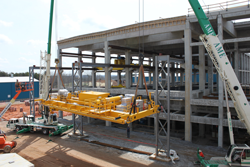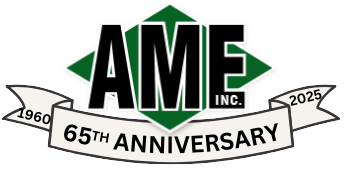 So, your company’s committed to relocating a heavy piece of equipment or the entire factory? The next step is to begin the bidding process with a handful of reputable industrial relocation contractors. While the prices may be similar, it’s important to realize that all are not created equal; you’ll want a company that can support you from the foundations through the startup of the machine.
So, your company’s committed to relocating a heavy piece of equipment or the entire factory? The next step is to begin the bidding process with a handful of reputable industrial relocation contractors. While the prices may be similar, it’s important to realize that all are not created equal; you’ll want a company that can support you from the foundations through the startup of the machine.
To do your due diligence, we recommend evaluating the following areas to ensure a successful partnership and a seamless move. You should feel confident that whoever you partner with shines in each of these categories.
-
Location, Location, Location
By far, the No. 1 consideration should be the contractor’s proximity to the project. If you’re moving machinery, they will be able to better accommodate schedule changes and support the delivery and installation process. Or, if you’re planning a factory relocation, you’ll want them near either the originating or final destination.
-
Trust in the Partnership
When it comes to the project, you don’t just want a contractor that will execute the plan, but people who will invest in creating a partnership. Trust is paramount, because you are handing over responsibility for your assets, your company’s lifeblood, to them. As scary as it sounds, once you load everything into the truck, it’s just like you’re sticking something in the mail.
A true partner will not only have clear communication skills and ensure you are comfortable each step of the way, they will also find clever ways to help you save money and efficiencies.
-
Network of Location-Specific Experts
A good relocation contractor will have a strong network of relocation experts. For example, if AME is helping a company move a production line from Charlotte to Buffalo, they can call one of their contacts to assist with the delivery. AME will pull the equipment out of the facility in North Carolina and, once it arrives in New York, their associates there can help with the instillation. An AME supervisor will typically follow the project because he is educated on how it came apart and the logistics, but this process will save you the cost of sending an entire crew when the expense of shipping heavy mobile equipment is already a hefty investment.
-
Adaptability
Industrial relocation projects require coordinating schedules, multi-phased projects and tight timelines with many last-minute orders and requests. An excellent contractor is someone who plans for everything, but is also flexible enough to change course along the way.
-
Access to Equipment and Resources
Does the company have the actual equipment necessary to complete the move, or is it subcontracted? This includes the simple equipment to fork trucks to cranes to precision alignment to the instrumentation and tools that the technicians need to reinstall the equipment
For example, AME recently needed to partner with a metrological contractor who specialized in large lathes, CNCs and all technical cutting machinery. They came in and spent several days, and even weeks, for some machines, measuring the equipment and its performance with lasers, interferometer and 3D spatial analyzers so that we’d have a very detailed, down-to-the-microns understanding of the ability of the machines and capacity to perform.
While your contractor should have the capacity to perform the majority of the project in-house, not many companies can be the expert at everything. Similar to the network of relocation experts, a contractor who has good relationships will ensure you have the best on your team regardless of the task.
-
Flexibility to Support Your Team
Some companies have team members who have the knowledge needed to execute an industrial relocation plan. Some have members who are not familiar with the process. Depending on your needs, speak with a full-service relocation contractor who’s skilled in all areas but is also flexible enough to create a partial scope of work, as well.
Just remember, it doesn’t matter if you’re moving a heavy piece of equipment or an entire facility, industrial relocation projects require extensive knowledge and experience in areas such as budgeting, transportation logistics, safety best practices, and local and international laws and taxes, to name a few. If you’re thinking about managing a move in-house, consider the four reasons why DIY relocations can cause unnecessary headaches, delays and unforeseen costs. (link to blog)
-
Evolving Technology
The relocation contractor should invest in staying up-to-date with new tools and techniques, but also integrate the knowledge from timeliness techniques and intrinsic knowledge from past projects.
-
Knowledge of Local and International Regulations
When moving across borders – domestically or internationally – understanding how to navigate the local laws, taxes and tariffs is essential. Properly calculating the commercial values of your goods will prevent getting your assets detained, which can delay or derail and project.
If your project includes an international move, it’s highly recommended you work with an industrial relocation contractor who has experience.
-
Dedication to Safety
Safety should be a pillar of any construction project. All teammates contributing to the relocation make sacrifices to deliver excellent results, and that means that everyone should have the right to leave work without injury. If safety first is at the forefront of a contractor’s culture, it becomes a natural part of the work.
-
Reliable References
Last, but certainly not least, you’ll want references from past clients and confirmation that they’ve done something of this nature or have experience handling that type of machinery or product line.
The prices from reputable companies should fall in line with each other, but credible testimonials and case studies will help you gain an understanding of their customer service and safety standards.
Important: If you receive a low-ball estimate from a contractor, be sure to take a deep look as to why that number is so different from their competitors.
Understanding how to decipher between an average contractor and expert can make or break your next industrial relocation project. As always, if you have any questions, the AME team is happy is to discuss your visions and goals.

